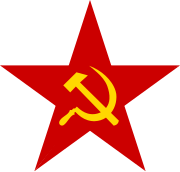Tentara Merah
Tentara Merah adalah julukan untuk Рабоче-крестьянская Красная армия (Raboche-krest'yanskaya Krasnaya armiya – Tentara Merah Buruh dan Petani),Julukan untuk ''Tentara Soviet'' dan juga angkatan bersenjata yang pertama didirikan oleh kaum Bolshevik selama Perang Saudara Rusia pada 1918. Organisasi ini menjadi tentara Uni Soviet setelah didirikannya URSS pada 1922, dan kemudian menjadi angkatan bersenjata terbesar di dunia dari tahun 1940-an sampai awal 1990-an. Mulai bulan Februari 1946, Tentara Merah, bersama dengan Angkatan Laut Soviet , mewujudkan komponen utama Angkatan Bersenjata Soviet ; mengambil nama resmi " Tentara Soviet ", sampai bubar pada Desember 1991.
| Tentara Merah Buruh dan Petani | |
|---|---|
 | |
| Aktif | 15 Januari 1918 – 25 Februari 1946 |
| Negara |
|
| Aliansi | Partai Komunis Uni Soviet |
| Tipe unit | Tentara |
| Peran | Peperangan darat |
| Jumlah personel | 17,600,000 total melayani (awal 1990an) 32.000.000 cadangan (awal 1990an) |
| Pertempuran | |
Tentara Merah memberikan pasukan darat terbesar dalam kemenangan Sekutu di teater Eropa Perang Dunia II , dan invasi Manchuria membantu penyerahan tanpa syarat dari Kekaisaran Jepang . Selama operasi di Front Timur , Tentara Merah berhasil membunuh dan menangkap sekitar 75-80% dari korban yang diderita Wehrmacht dan Waffen-SS selama perang dan akhirnya merebut ibukota Jerman Nazi , Berlin .
Bibliografi
- Carrere D'Encausse, Helene. The End of the Soviet Empire: The Triumph of the Nations, Basic Books, 1992, ISBN 0-465-09818-5.
- Chamberlain, William Henry (1957), The Russian Revolution: 1917–1921, New York: Macmillan.
- Erickson, John (1962), The Soviet High Command 1918–41 – A Military-Political History, London: MacMillan, OCLC 569056.
- Glantz, David M (1998), Stumbling Colossus: The Red Army on the Eve of World War, University Press of Kansas, ISBN 978-0-7006-0879-9.
- ——— (2005), Colossus Reborn, University Press of Kansas, ISBN 978-0-7006-1353-3.
- House, Jonathan M (1984), Toward Combined Arms Warfare: A Survey of 20th Century Tactics, Doctrine, and Organization (PDF), Fort Leavenworth, KS: US Army Command and General Staff College, OCLC 11650157, 66027–6900.
- Isby, David C. Weapons and Tactics of the Soviet Army, Jane's, 1988, ISBN 978-0-7106-0352-4.
- Merridale, Catherine (2006), Ivan's War: Life and Death in the Red Army, 1939–1945, New York: Macmillan, ISBN 978-0-8050-7455-0.
- ——— (2007) [2006], Ivan's War: Life and Death in the Red Army, 1939–1945, New York: Macmillan, ISBN 978-0-312-42652-1.
- Moynahan, Brian. Claws of the Bear: The History of the Red Army from the Revolution to the Present (1989).
- Odom, William E. The Collapse of the Soviet Military, Yale University Press, New Haven and London, 1998, ISBN 978-0-300-07469-7.
- Overy, RJ (2004), The Dictators: Hitler's Germany and Stalin's Russia, WW Norton, ISBN 978-0-393-02030-4.
- Overmans, Rűdiger (2000), Deutsche militärische Verluste im Zweiten Weltkrieg (dalam bahasa German), Oldenbourg, ISBN 3-486-56531-1.
- Reese, Roger R. Why Stalin's Soldiers Fought: The Red Army's Military Effectiveness in World War II (University Press of Kansas; 2011) 400 pp.
- Schofield, Carey (1991), Inside the Soviet Army, London: Headline, ISBN 978-0-7472-0418-3.
- Scott, Harriet Fast; Scott, William F (1984), The Armed Forces of the USSR (edisi ke-3rd), Boulder, CO: Westview, ISBN 0-86531-792-5.
- Shaw, John (1979), Red Army Resurgent, Alexandria, VA: Time-Life, ISBN 0-8094-2520-3.
- Tolstoy, Nikolai (1981), Stalin's Secret War, New York: Holt, Rinehart & Winston, ISBN 0-03-047266-0.
- Williams, Beryl (1987), The Russian Revolution 1917–1921, Blackwell, ISBN 978-0-631-15083-1.
- Zaloga, Steven; Grandsen, James (1984), Soviet Tanks and Combat Vehicles of World War Two, London: Arms & Armour.